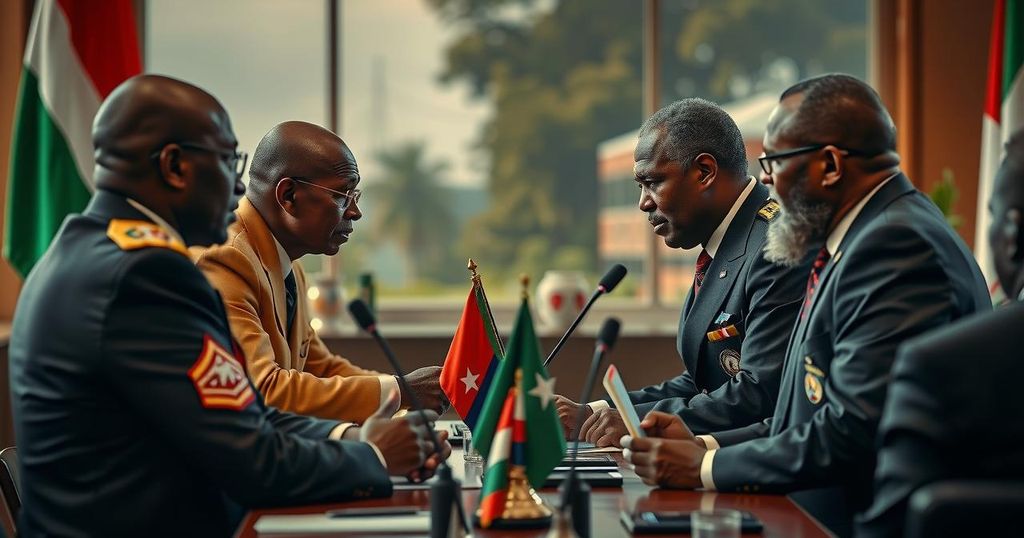Kenya’s President Ruto Engages in Peace Talks with South Sudan’s Salva Kiir

President William Ruto of Kenya is in Juba to engage in peace talks with President Salva Kiir of South Sudan, as part of the Tumaini initiative. The discussions aim to address enduring conflicts and improve regional infrastructure projects, such as the Lapsset Corridor, which is vital for trade connectivity. Ruto’s mediation follows recent meetings with South Sudanese opposition parties, indicating a commitment to consolidating peace efforts in the nation.
Kenyan President William Ruto has traveled to Juba, South Sudan, in an effort to initiate peace talks aimed at addressing the persistent conflicts that have hindered the nation’s rebuilding initiatives. This diplomatic mission includes a scheduled discussion with President Salva Kiir, focusing on establishing a framework for enduring peace as part of the Tumaini initiative. According to State House Spokesperson Hussein Mohammed, the initiative has advanced over the past six months through extensive dialogues with significant South Sudanese stakeholders, aiming to create a lasting peace in the region. Additionally, the negotiations will highlight the advancement of infrastructure projects that are vital for both South Sudan and Kenya. The statement from State House indicated that attendees would also deliberate on strategic regional initiatives, such as the Lapsset Corridor, designed to enhance trade connectivity between South Sudan and the Indian Ocean. President Ruto’s trip follows a meeting with South Sudanese opposition representatives to the Tumaini Initiative, who affirmed their commitment to the Tumaini Consensus, a pivotal element of ongoing peace discussions. Kenya has been actively mediating between conflicting factions in South Sudan, evidenced by President Ruto’s efforts in May, where he led a commitment ceremony for peace, uniting both factions against violence. The mediation efforts, overseen by former army commander Lazurus Sumbeiywo, who notably facilitated the 2005 Sudan Comprehensive Peace Agreement, have been met with increasing acceptance among previously hesitant groups. Many of these factions had initially resisted signing the 2018 peace deal orchestrated by the Intergovernmental Authority on Development (IGAD), which concluded a civil war that had plagued the South Sudanese government under President Salva Kiir since 2013.
The ongoing conflict in South Sudan has severely impeded the country’s development and reconstruction efforts since its independence in 2011. Initially rooted in political disputes, the conflict has seen numerous factions emerge, resulting in a protracted civil war that has led to substantial loss of life and displacement. Mediation initiatives like the Tumaini project seek to establish dialogue and consensus among these factions, with Kenya taking a central role in facilitating discussions to foster peace. The country’s involvement has historical significance, given its previous success in mediating crucial peace agreements in the region. The Lapsset Corridor is a key infrastructural project in this context, designed to enhance trade relations and foster regional stability through improved connectivity. This initiative aligns with broader ambitions to stabilize the region economically and politically by reducing the impacts of conflict and promoting cooperation.
In summary, President William Ruto’s visit to Juba represents a significant step towards fostering peace and navigating the complexities of conflicts in South Sudan. The discussions with President Salva Kiir, as well as opposition parties, aim to solidify a foundation for long-term stability through the Tumaini initiative. The ongoing mediation efforts by Kenya, highlighting strategic regional projects such as the Lapsset Corridor, underscore the importance of collaborative approaches to resolve endemic challenges and support South Sudan’s reconstruction endeavors.
Original Source: www.theeastafrican.co.ke








